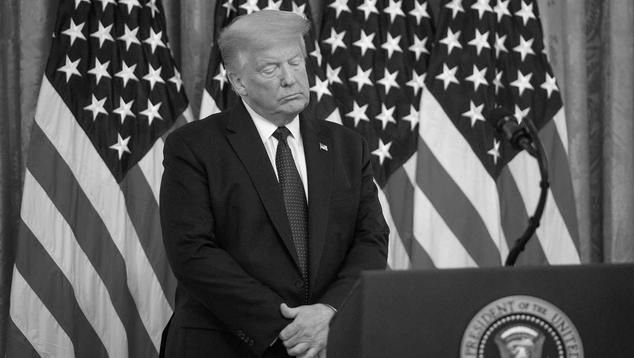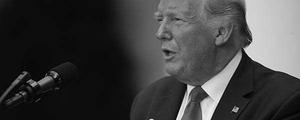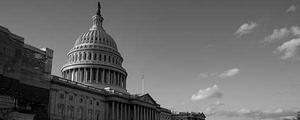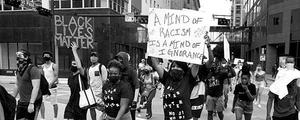Story Highlights
- Americans' economic confidence now among lowest for recent election years
- Still, few cite the economy as "most important problem"
- Trump's job rating on the economy down sharply, but remains solid
WASHINGTON, D.C. -- Americans' views of the U.S. economy and how President Donald Trump is handling it offer both positive and negative signals regarding Trump's reelection. Even the positive signals, however, have grown weaker since the pandemic began.
In January, Americans were mostly positive about U.S. economic conditions, a record few cited the economy as the nation's top problem and a solid majority approved of Trump's handling of the economy. Today, Americans' views have turned negative, they are more likely to name the economy as the top problem and Trump's job approval rating on the issue has dropped below 50%.
| Jan 2-15, 2020 | May 28-Jun 5, 2020 | ||||||||||||||||||||||||||||||||||||||||||||||||||||||||||||||||||||||||||||||||||||||||||||||||||
|---|---|---|---|---|---|---|---|---|---|---|---|---|---|---|---|---|---|---|---|---|---|---|---|---|---|---|---|---|---|---|---|---|---|---|---|---|---|---|---|---|---|---|---|---|---|---|---|---|---|---|---|---|---|---|---|---|---|---|---|---|---|---|---|---|---|---|---|---|---|---|---|---|---|---|---|---|---|---|---|---|---|---|---|---|---|---|---|---|---|---|---|---|---|---|---|---|---|---|---|
| Gallup Economic Confidence Index (ECI) | +40 | -21 | |||||||||||||||||||||||||||||||||||||||||||||||||||||||||||||||||||||||||||||||||||||||||||||||||
| Economy/Jobs/Inflation named "most important problem" | 3% | 13% | |||||||||||||||||||||||||||||||||||||||||||||||||||||||||||||||||||||||||||||||||||||||||||||||||
| Approval of Trump on the economy ^ | 63% | 47% | |||||||||||||||||||||||||||||||||||||||||||||||||||||||||||||||||||||||||||||||||||||||||||||||||
| ^ Trump approval on the economy is from a Jan. 16-29, 2020, poll. | |||||||||||||||||||||||||||||||||||||||||||||||||||||||||||||||||||||||||||||||||||||||||||||||||||
| Gallup | |||||||||||||||||||||||||||||||||||||||||||||||||||||||||||||||||||||||||||||||||||||||||||||||||||
So what do these diminished economic ratings suggest for Trump's reelection? In short, they put him in a gray zone between presidents who have won a second term with better ratings on one or more economic measures than Trump has now (Barack Obama, George W. Bush, Bill Clinton and Ronald Reagan) and those who have lost their reelection bid, with the public expressing much more concern about the economy than they do today (George H.W. Bush, Jimmy Carter and Gerald Ford).
Here are more details on the historical context in which to interpret these indicators as the rest of 2020 unfolds.
Presidential Job Approval on the Economy
Trump started 2020 with the highest economic approval rating in an election year of any president seeking reelection since Gallup began measuring economic approval in the current approve/disapprove format during Reagan's presidency.
Trump's 63% approval rating on the economy in January slipped to 58% in February, matching Clinton's prior record high in October 1996, just before he won reelection in a landslide. Trump's rating has fallen to 47% in Gallup's May 28-June 5 poll.
While below 50%, Trump approval on the economy is still on par with the October ratings earned by Obama (45% in 2012) and George W. Bush (46% in 2004) before each won reelection. It is well above the 18% approval George H.W. Bush received in 1992, shortly before he lost his bid for a second term.
| Reading closest to January in Q1 |
Reading closest to June in Q2 |
Final pre-election |
|||||||||||||||||||||||||||||||||||||||||||||||||||||||||||||||||||||||||||||||||||||||||||||||||
|---|---|---|---|---|---|---|---|---|---|---|---|---|---|---|---|---|---|---|---|---|---|---|---|---|---|---|---|---|---|---|---|---|---|---|---|---|---|---|---|---|---|---|---|---|---|---|---|---|---|---|---|---|---|---|---|---|---|---|---|---|---|---|---|---|---|---|---|---|---|---|---|---|---|---|---|---|---|---|---|---|---|---|---|---|---|---|---|---|---|---|---|---|---|---|---|---|---|---|---|
| % | % | % | |||||||||||||||||||||||||||||||||||||||||||||||||||||||||||||||||||||||||||||||||||||||||||||||||
| Trump (2020) | 63 | 47 | -- | ||||||||||||||||||||||||||||||||||||||||||||||||||||||||||||||||||||||||||||||||||||||||||||||||
| Obama (2012) | 38 | -- | 45 | ||||||||||||||||||||||||||||||||||||||||||||||||||||||||||||||||||||||||||||||||||||||||||||||||
| G.W. Bush (2004) | 54 | 41 | 46 | ||||||||||||||||||||||||||||||||||||||||||||||||||||||||||||||||||||||||||||||||||||||||||||||||
| Clinton (1996) | 44 | 49 | 58 | ||||||||||||||||||||||||||||||||||||||||||||||||||||||||||||||||||||||||||||||||||||||||||||||||
| G.H.W. Bush (1992) | 24 | 21 | 18 | ||||||||||||||||||||||||||||||||||||||||||||||||||||||||||||||||||||||||||||||||||||||||||||||||
| Reagan (1984) | 48 | 48 | 50 | ||||||||||||||||||||||||||||||||||||||||||||||||||||||||||||||||||||||||||||||||||||||||||||||||
| Gallup | |||||||||||||||||||||||||||||||||||||||||||||||||||||||||||||||||||||||||||||||||||||||||||||||||||
Given the wide gap between Bush's 18% economic approval rating before the 1992 election and the 45% seen for Obama in 2012, it is not clear what the minimum economic approval rating needed for reelection might be. However, if Trump's rating approaches either end of the 18% to 45% range closer to the election, that could indicate whether the economy is more of an asset or a liability to his campaign.
Trump's overall job approval rating will likely remain the more important indicator of his reelection chances. His 39% job approval in Gallup's latest polling is a long way from the safety zone near 50% associated with past presidents who prevailed.
Economic Confidence
The Gallup Economic Confidence Index (ECI) is a summary of Americans' ratings of current economic conditions and their outlook for the economy. The index is the average of net positive responses to the current conditions question (("excellent" plus "good") minus "poor") and net positive responses to the outlook question ("getting better" minus "getting worse"), and has a theoretical range of -100 to +100.
As a result of the COVID-19 pandemic, Americans' rating of the economy as measured by the ECI went from strongly positive in January (+40) to decidedly negative in the first half of April (-32). It has since improved slightly to -21 in June.
January's +40 ECI score is roughly tied with the +41 in February as the highest Gallup has recorded in any presidential election year with an incumbent since 1992. By contrast, today's -21 score is among the lowest, significantly below the readings of -1 or higher seen at the end of 2012, 2004 and 1996, when the incumbent presidents prevailed.
Today's ECI score is not as low as the -37 recorded at the end of the 1992 campaign -- the only available election year in the trend for this metric when the incumbent lost.
| Reading closest to January in Q1 |
Reading closest to June in Q2 |
Final pre-election |
|||||||||||||||||||||||||||||||||||||||||||||||||||||||||||||||||||||||||||||||||||||||||||||||||
|---|---|---|---|---|---|---|---|---|---|---|---|---|---|---|---|---|---|---|---|---|---|---|---|---|---|---|---|---|---|---|---|---|---|---|---|---|---|---|---|---|---|---|---|---|---|---|---|---|---|---|---|---|---|---|---|---|---|---|---|---|---|---|---|---|---|---|---|---|---|---|---|---|---|---|---|---|---|---|---|---|---|---|---|---|---|---|---|---|---|---|---|---|---|---|---|---|---|---|---|
| Trump (2020) | +40 | -21 | -- | ||||||||||||||||||||||||||||||||||||||||||||||||||||||||||||||||||||||||||||||||||||||||||||||||
| Obama (2012) ^ | -23 | -14 | -1 | ||||||||||||||||||||||||||||||||||||||||||||||||||||||||||||||||||||||||||||||||||||||||||||||||
| G.W. Bush (2004) | +33 | +8 | +3 | ||||||||||||||||||||||||||||||||||||||||||||||||||||||||||||||||||||||||||||||||||||||||||||||||
| Clinton (1996) | -- | +1 | +23 | ||||||||||||||||||||||||||||||||||||||||||||||||||||||||||||||||||||||||||||||||||||||||||||||||
| G.H.W. Bush (1992) | -- | -31 | -37 | ||||||||||||||||||||||||||||||||||||||||||||||||||||||||||||||||||||||||||||||||||||||||||||||||
| ^ 2012 ECI scores are based on Gallup Daily tracking, with adjustments to match ECI scores based on Gallup cross-sectional polls | |||||||||||||||||||||||||||||||||||||||||||||||||||||||||||||||||||||||||||||||||||||||||||||||||||
| Gallup | |||||||||||||||||||||||||||||||||||||||||||||||||||||||||||||||||||||||||||||||||||||||||||||||||||
The large gap between economic confidence in 2012 (when Obama won) and 1992 (when Bush lost) makes it difficult to pinpoint the level at which economic confidence becomes a significant liability for the president. It's also important to note that there is time for economic confidence to improve before the election, as it did for Obama and Clinton. If Trump sees a similar degree of improvement between now and the election, economic confidence would be more on par with the levels for presidents who won reelection.
The Economy as Most Important Problem
Gallup's historical "most important problem" question, originating in 1939, provides a much longer trend line on Americans' concerns about the economy during presidential election years than the Economic Confidence Index.
The combined 3% of Americans naming the economy, jobs or inflation as the nation's top problem in January was a record low for a presidential reelection year. While the figure has increased to 13% in June, this remains on the low side of the range from 7% to 79% seen in all other reelection years since 1964.
In the final pre-election readings of the most important problem from 1964 to 2012, the combined mentions of the economy, jobs or inflation averaged 34% in the six years when the incumbent won and 70% in the three years when the incumbent lost.
| Reading closest to January in Q1 |
Reading closest to June in Q2 |
Final pre-election |
|||||||||||||||||||||||||||||||||||||||||||||||||||||||||||||||||||||||||||||||||||||||||||||||||
|---|---|---|---|---|---|---|---|---|---|---|---|---|---|---|---|---|---|---|---|---|---|---|---|---|---|---|---|---|---|---|---|---|---|---|---|---|---|---|---|---|---|---|---|---|---|---|---|---|---|---|---|---|---|---|---|---|---|---|---|---|---|---|---|---|---|---|---|---|---|---|---|---|---|---|---|---|---|---|---|---|---|---|---|---|---|---|---|---|---|---|---|---|---|---|---|---|---|---|---|
| % | % | % | |||||||||||||||||||||||||||||||||||||||||||||||||||||||||||||||||||||||||||||||||||||||||||||||||
| Trump (2020) | 3 | 13 | -- | ||||||||||||||||||||||||||||||||||||||||||||||||||||||||||||||||||||||||||||||||||||||||||||||||
| Obama (2012) | 58 | 56 | 64 | ||||||||||||||||||||||||||||||||||||||||||||||||||||||||||||||||||||||||||||||||||||||||||||||||
| G.W. Bush (2004) | 30 | 34 | 34 | ||||||||||||||||||||||||||||||||||||||||||||||||||||||||||||||||||||||||||||||||||||||||||||||||
| Clinton (1996) | 26 | 29 | 22 | ||||||||||||||||||||||||||||||||||||||||||||||||||||||||||||||||||||||||||||||||||||||||||||||||
| G.H.W. Bush (1992) | 32 | 51 | 66 | ||||||||||||||||||||||||||||||||||||||||||||||||||||||||||||||||||||||||||||||||||||||||||||||||
| Reagan (1984) | 64 | 48 | 42 | ||||||||||||||||||||||||||||||||||||||||||||||||||||||||||||||||||||||||||||||||||||||||||||||||
| Carter (1980) | 79 | 73 | 66 | ||||||||||||||||||||||||||||||||||||||||||||||||||||||||||||||||||||||||||||||||||||||||||||||||
| Ford (1976) | 71 | 62 | 78 | ||||||||||||||||||||||||||||||||||||||||||||||||||||||||||||||||||||||||||||||||||||||||||||||||
| Nixon (1972) | 24 | 16 | 31 | ||||||||||||||||||||||||||||||||||||||||||||||||||||||||||||||||||||||||||||||||||||||||||||||||
| Johnson (1964) | 14 | 34 | 13 | ||||||||||||||||||||||||||||||||||||||||||||||||||||||||||||||||||||||||||||||||||||||||||||||||
| Gallup | |||||||||||||||||||||||||||||||||||||||||||||||||||||||||||||||||||||||||||||||||||||||||||||||||||
The disjuncture this year between Americans' low ratings of economic conditions and their low mentions of the economy as the top problem is a pattern not previously seen over the years Gallup has tracked both measures.
One reason economic mentions were not higher in April and May of this year, more in line with the negative ECI scores that had set in by then, is that COVID-19 was the dominant response, named by 40% to 45% of Americans. That was followed by government (reflecting a mix of grievances about the leaders in both parties). As troubling as the economy was, Americans were simply more focused on other things. More recently, race relations has emerged as a top-tier issue.
However, because up to three responses are recorded for each respondent, one might expect economic mentions to be even higher than they currently are. The fact that they aren't could mean that Americans believe the economic disruption caused by COVID-19 is temporary, or they may simply categorize today's economic problems as fundamentally stemming from COVID-19.
How this figure changes between now and November could indicate whether the 2020 recession is a strong liability for Trump.
Bottom Line
Before the coronavirus brought the country to a near standstill in March, Americans' ratings of the economy and the president's performance on it were as good as they get in an election year. Other issues may have ultimately overshadowed the economy in voters' choice for president, but the economy was still a positive component of the value proposition Trump was offering for another four years in office.
With the U.S. economy formally slipping into a recession in February, Trump's reelection now appears in jeopardy. At the same time, the 2020 recession is unusual in that it was brought on by a pandemic, at least partially shielding Trump from blame. These nuances are seen in Trump's approval rating on the economy, which remains relatively strong, and the low percentage of Americans still citing the economy as the nation's top problem.
Normally, how these metrics shift over the next four months could affect whether Trump wins or loses in November, and by how much. But with the coronavirus still ravaging the country and Trump's job approval rating lagging significantly behind his rating on the economy, it's not clear that the economy will have as much effect as it usually does on the outcome. Americans' confidence in the economy and Trump's handling of it are still likely to have some influence on their vote. But his overall presidential job approval rating may better capture the multitude of factors voters will consider as they cast their ballot.
Explore President Trump's approval ratings and compare them with those of past presidents in the Gallup Presidential Job Approval Center.
Learn more about how the Gallup Poll Social Series works.




